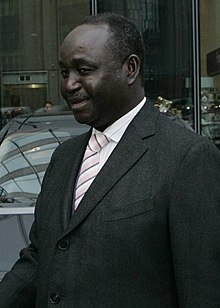Francois Bozize
| François Bozizé | |
|---|---|
 |
|
| 6th President of the Central African Republic | |
|
In office 15 March 2003 – 24 March 2013 |
|
| Prime Minister |
Abel Goumba Célestin Gaombalet Élie Doté Faustin-Archange Touadéra Nicolas Tiangaye |
| Vice President | Abel Goumba |
| Preceded by | Ange-Félix Patassé |
| Succeeded by | Michel Djotodia |
| Personal details | |
| Born |
François Bozizé Yangouvonda 14 October 1946 Mouila, French Equatorial Africa (now Mouila, Gabon) |
| Political party | Independent |
| Spouse(s) | Monique Bozizé |
| Religion | Christian |
| Military service | |
| Allegiance |
|
| Service/branch | Land forces |
| Years of service | 1969—2005 |
| Rank | General, Minister of Defence, Chief of Army Staff |
| Commands | Central African Armed Forces |
| Battles/wars |
2003 Central African Republic coup d'état Central African Republic Bush War Central African Republic conflict (2012—present) |
François Bozizé Yangouvonda (born 14 October 1946) is a Central African politician who was the President of the Central African Republic from 2003 to 2013.
Bozizé rose to become a high-ranking army officer in the 1970s, under the rule of Jean-Bédel Bokassa. After Bokassa was ousted, Bozizé served in the government as Minister of Defense from 1979 to 1981 and as Minister of Information from 1981 to 1982. He participated in a failed 1982 coup attempt against President André Kolingba and subsequently fled the country. Years later, he served as Army Chief of Staff under President Ange-Félix Patassé, but he began a rebellion against Patassé in 2001.
Bozizé's forces captured the capital, Bangui, in March 2003, while Patassé was outside the country, and Bozizé took power, ushering in a transitional period of government. He won the March–May 2005 presidential election in a second round of voting, and he was re-elected in the January 2011 presidential election, winning the vote in the first round.
In December 2012, the CAR was plunged into an uprising by rebel forces who condemned the Bozizé government for not honoring peace agreements after the Central African Republic Bush War in 2007. On 24 March 2013, Bozizé fled to Cameroon via the Democratic Republic of the Congo after the rebel forces attacked Bangui and took control of the presidential palace. There, he was housed by Paul Biya, President of the Republic. On May 29, 2013, an international arrest warrant was issued against Bozizé by the Central African Justice.
Bozizé was born in Gabon, a member of the Gbaya people, and attended a military officers' training college in the Central African province of Bouar. He became a second lieutenant in 1969 and a captain in 1975. He was appointed Brigadier General by Emperor Jean-Bédel Bokassa in 1978, after he beat a French noncommissioned officer who had been disrespectful to the president. With General Josyhat Mayomokala, Bozizé ordered military personnel to attack young demonstrators who were asking for their parents' arrears. After Bokassa was ousted by David Dacko in 1979, Bozizé was appointed Minister of Defense after an operation that the French army used to overthrew Dacko (Operation Barracuda). Following Dacko's ouster by André Kolingba in September 1981, Bozizé was appointed Minister of Information, but fled to the north of the country with 100 soldiers after his involvement in a failed coup attempt led by Ange-Félix Patassé on 3 March 1982, in which he accused Kolingba of treason and proclaimed the change of power on Radio Bangui. He then obtained refuge in France. Bozizé was arrested in Cotonou, Benin in July 1989, and imprisoned and tortured. He was put on trial by Kolingba on charges of helping the coup d'état in May but was acquitted on 24 September 1991 and released from prison on 1 December. He then sought refuge in France, where he remained for nearly two years.
...
Wikipedia
